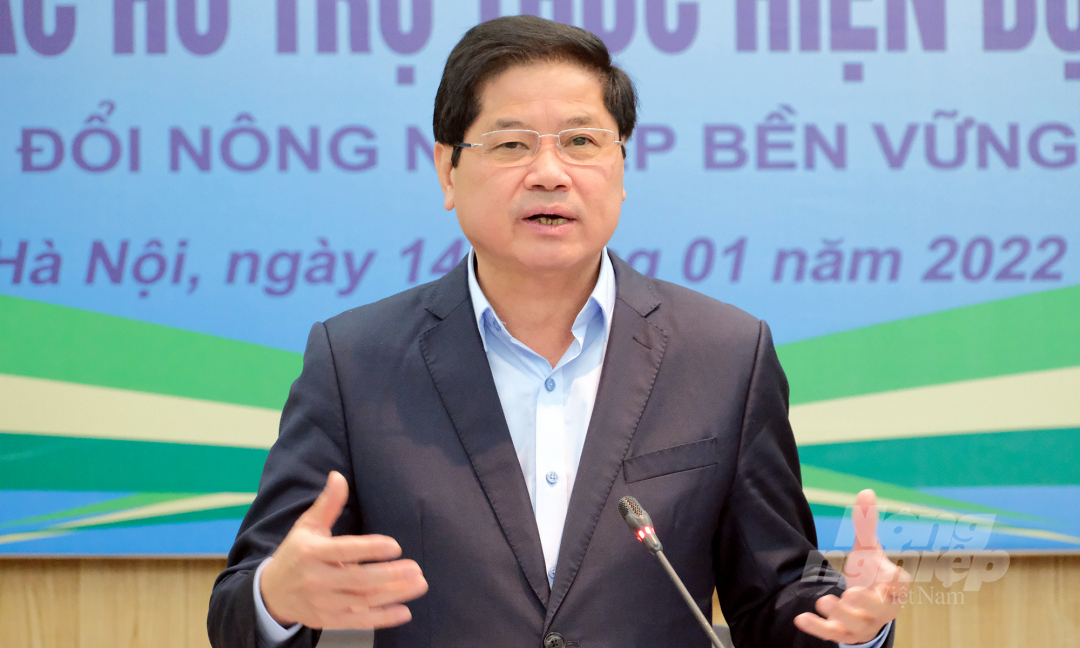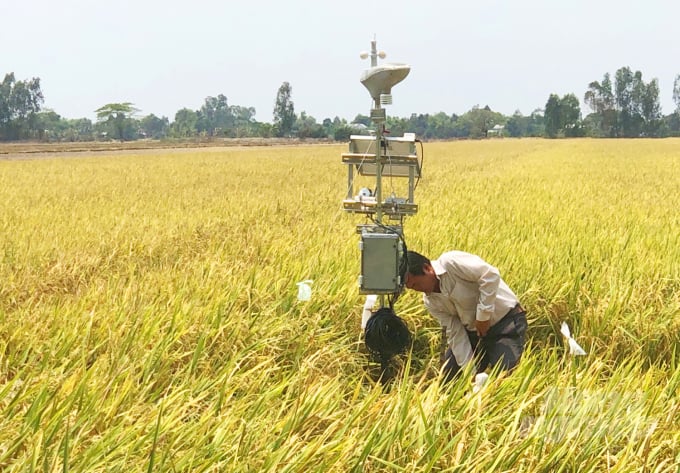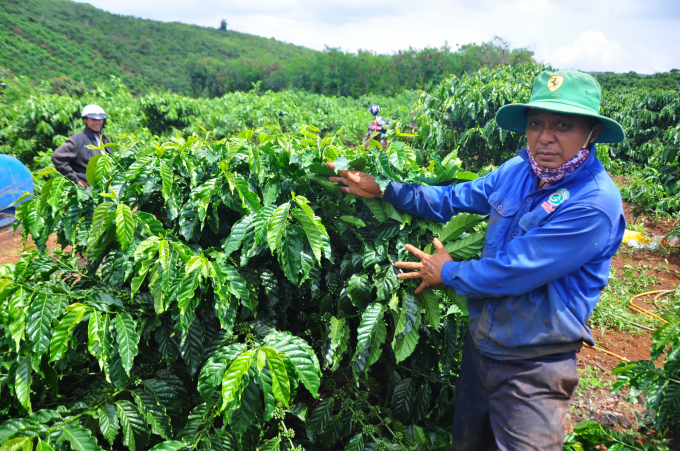June 2, 2025 | 20:18 GMT +7
June 2, 2025 | 20:18 GMT +7
Hotline: 0913.378.918
June 2, 2025 | 20:18 GMT +7
Hotline: 0913.378.918

Deputy Minister Le Quoc Doanh attended and directed the Conference summarizing the VnSAT Project. Photo: Ba Thang.
On January 14, the Ministry of Agriculture and Rural Development coordinated with the World Bank (WB) and related units to organize the Conference summarizing the Vietnam SustainableAgricuture Transformation Project.
The Vietnam SustainableAgricuture Transformation Project (VnSAT Project) took effect on December 3, 2015, with a total initial capital of US$ 301 million. Adjusted capital, according to Decision 742/QD-TTg dated June 3, 2020, is US$ 288.2 million, of which WB loan is US$ 221.8 million, Government counterpart fund is US$ 30.63 million, and the capital from the private sector is US$ 35 million.
The VnSAT project consists of 4 components. Specifically: Component A: Institutional Strengthening to Support Agricultural Transformation; Component B: Supporting Sustainable Rice-Based Systems; Component C: Supporting Sustainable Coffee Production and Rejuvenation; and Component D: Project Management, Monitoring and Evaluation.
The scope of project activities in 13 cities and provinces includes An Giang, Can Tho, Dong Thap, Hau Giang, Kien Giang, Long An, Soc Trang, Tien Giang, Kon Tum, Gia Lai, Dak Lak, Dak Nong, Lam Dong. In addition, seven provinces participating in the pilot implementation of Component A are Vinh Phuc, Nam Dinh, Thanh Hoa, Ha Tinh, Binh Dinh, Dong Thap, Lam Dong.
The development objective of the project is to contribute to the implementation of the Agricultural Sector Restructuring Scheme through strengthening the sector's institutional capacity; innovating sustainable farming methods, and improving value chains for the rice and coffee industries in two key commodity-producing regions of Vietnam, the Mekong Delta and the Central Highlands.
Specifically, for the rice: 200,000 hectares of rice production by 140,000 farmer households applying advanced technology, farmers' profit per hectare is expected to increase by 30%, the total added value for the whole region is about US$ 40-60 million per year.

In recent years, the VnSAT project has made an important contribution to the positive transformation of the rice industry in the Mekong Delta.
For coffee: 69,000 hectares of coffee of 63,000 sustainable farming households, applying advanced technology, farmers' profit per hectare is expected to increase by about VND 15 million per hectares compared to coffee non-applied sustainable farming or no re-cultivation; the total added value for the whole region is about US$ 48 - 50 million per year (US$ 242 - 250 million for five years). This profit will last throughout the coffee business cycle (20-25 years).
Evaluating the results of the VnSAT project, Deputy Minister of Agriculture and Rural Development Le Quoc Doanh said that implementing units have worked closely with localities to find many "favorable" solutions, promoting multi-valued linkages of the industry chain.
Taking the example of coffee replanting in the Central Highlands, Deputy Minister Le Quoc Doanh emphasized the outstanding productivity of this region (about 3.5 times the world's average yield) and developed the total acreage cultivating 50,000 hectares more than planned.
"Thank you very much to the World Bank for keeping in constant communication with the Ministry of Agriculture and Rural Development to unify the direction of the locality. Many thanks to the provinces, cities, and related units for their efforts to achieve these results exceeded the goal," said Deputy Minister Doanh.
Mr. Le Huu Toan, Deputy Director of Kien Giang Department of Agriculture and Rural Development, said that the VnSAT project contributes to sustainable rice cultivation. Currently, Kien Giang province has completed about 50% of the project volume. The province commits to proactively reciprocating capital sources and achieving the targets by June 2022.
In conclusion, Deputy Minister Le Quoc Doanh said that the rest of the project has about 120 sub-projects. He suggested that localities focus on deploying in the current dry weather, especially when the Covid-19 epidemic has been controlled in the southern provinces and cities.
"Everything needs to be kept on schedule, making detailed plans for each week, each month. The central government closely cooperates with the locality, especially when dealing with site clearance issues," emphasized Deputy Minister Le Quoc Doanh.

Coffee farmers in the Central Highlands have made essential changes in their awareness and cultivation of coffee trees due to the VnSAT Project.
In parallel with ensuring the progress of implementation, Deputy Minister Le Quoc Doanh also requested that the construction parties of the project need to ensure the work quality. Because the VnSAT project is an investment for cooperatives and farmers, with capital from the World Bank, therefore, when constructing, supervisors must pay attention to both the aesthetics and the form of the work.
Deputy Minister Le Quoc Doanh said that after the Lunar New Year, the Ministry of Agriculture and Rural Development would visit VnSAT project implementation models in the Mekong Delta and organize some conferences to learn about difficulties and discuss solutions to resolve problems.
In addition to ensuring the progress of the sub-projects, Deputy Minister Le Quoc Doanh directed the units to continue focusing on training, training, and replicating the model of participating in the VnSAT project. Also, he asked to organize and evaluate the results in actual production.
It is less than six months from now to the end of the VnSAT project. Therefore, the Ministry of Agriculture and Rural Development leaders noted the units, especially the Finance Department, about closing the project based on the guidance from the relevant decrees.
"We need to coordinate to create resonance and spread the values of the VnSAT Project to society," emphasized Deputy Minister Doanh.
Mr. Cao Thang Binh, a senior agricultural expert of the World Bank, expressed his satisfaction with the completed components of the VnSAT project in Vietnam. He hopes that the WB and the Ministry of Agriculture and Rural Development will continue to cooperate in the coming time.
Translated by Ha Phuc

(VAN) Novel process harnesses machine learning to reveal groups of genes that determine how efficiently plants use nitrogen.

(VAN) Several scientists and farmers are experimenting with soil treatment in some key durian-growing regions such as Cai Lay (Tien Giang), Dak Song, Gia Nghia, and Dak R’lap (Dak Nong).
/2025/05/25/4127-3-073637_820.jpg)
(VAN) Thanks to the promotion from an FAO-implemented project, vegetable production in greenhouses in Moc Chau has seen strong development, from 1.5 hectares in 2021 to nearly 50 hectares in 2024.

(VAN) FAO has recently supported USD 140,000 to implement the project 'Risk mitigation human-animal interface risks through disease control initiatives in pig farming.'

(VAN) The People's Committee of Tra Vinh province has approved an adjustment to the investment policy for the Green Hydrogen Plant project, increasing its area to approximately 52.76 hectares.
![Reducing emissions from rice fields: [2] Farmers’ commitment to the soil](https://t.ex-cdn.com/nongnghiepmoitruong.vn/608w/files/news/2025/05/05/dsc08881jpg-nongnghiep-140632.jpg)
(VAN) Clean rice cultivation model in Thuong Tan commune, Bac Tan Uyen district, is assisting local residents in achieving sustainable agriculture by substantially reducing costs, increasing productivity, and protecting the environment.

(VAN) At the conference to disseminate Resolution No. 68, AgriS introduced its digital agricultural ecosystem and reaffirmed its commitment to accompanying the Government in promoting private sector development and sustainable agriculture.